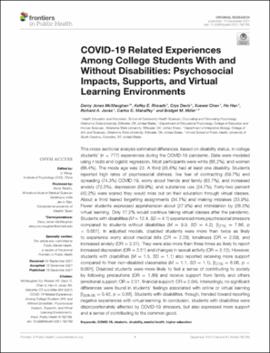| dc.contributor.author | McMaughan, Darcy Jones | |
| dc.contributor.author | Rhoads, Kelley E. | |
| dc.contributor.author | Davis, Crys | |
| dc.contributor.author | Chen, Xuewei | |
| dc.contributor.author | Han, Ho | |
| dc.contributor.author | Jones, Richard A. | |
| dc.contributor.author | Mahaffey, Carlos C. | |
| dc.contributor.author | Miller, Bridget M. | |
| dc.date.accessioned | 2022-04-19T20:18:24Z | |
| dc.date.available | 2022-04-19T20:18:24Z | |
| dc.date.issued | 2021-12-10 | |
| dc.identifier | oksd_han_COVID-19relatedexperiences_2021 | |
| dc.identifier.citation | McMaughan, D. J., Rhoads, K. E., Davis, C., Chen, X., Han, H., Jones, R. A., ... Miller, B. M. (2021). COVID-19 related experiences among college students with and without disabilities: Psychosocial impacts, supports, and virtual learning environments. Frontiers in Public Health, 9, Article 782793. https://doi.org/10.3389/fpubh.2021.782793 | |
| dc.identifier.uri | https://hdl.handle.net/11244/335258 | |
| dc.description.abstract | This cross-sectional analysis estimated differences, based on disability status, in college students' (n = 777) experiences during the COVID-19 pandemic. Data were modeled using t-tests and logistic regression. Most participants were white (86.2%), and women (66.4%). The mode age was 23. A third (35.6%) had at least one disability. Students reported high rates of psychosocial distress, like fear of contracting (59.7%) and spreading (74.3%) COVID-19, worry about friends and family (83.7%), and increased anxiety (72.5%), depression (59.9%), and substance use (24.7%). Forty-two percent (42.2%) were scared they would miss out on their education through virtual classes. About a third feared forgetting assignments (34.1%) and making mistakes (33.9%). Fewer students expressed apprehension about (27.9%) and intimidation by (26.3%) virtual learning. Only 17.2% would continue taking virtual classes after the pandemic. Students with disabilities (M = 12.4, SD = 4.1) experienced more psychosocial stressors compared to students without disabilities (M = 9.9, SD = 4.2), [t(775) = 7.86, p < 0.001]. In adjusted models, disabled students were more than twice as likely to experience worry about medical bills (OR = 2.29), loneliness (OR = 2.09), and increased anxiety (OR = 2.31). They were also more than three times as likely to report increased depression (OR = 3.51) and changes in sexual activity (OR = 3.12). However, students with disabilities (M = 1.5, SD = 1.1) also reported receiving more support compared to their non-disabled classmates (M = 1.1, SD = 1.1), [t(775) = 6.06, p < 0.001]. Disabled students were more likely to feel a sense of contributing to society by following precautions (OR = 1.80) and receive support from family and others (emotional support: OR = 2.01, financial support: OR = 2.04). Interestingly, no significant differences were found in students' feelings associated with online or virtual learning [t(526.08) = 0.42, p = 0.68]. Students with disabilities, though, trended toward reporting negative experiences with virtual learning. In conclusion, students with disabilities were disproportionately affected by COVID-19 stressors, but also expressed more support and a sense of contributing to the common good. | |
| dc.format | application/pdf | |
| dc.language | en_US | |
| dc.publisher | Frontiers Media SA | |
| dc.relation.ispartof | Frontiers in Public Health, 9 | |
| dc.relation.uri | https://www.ncbi.nlm.nih.gov/pubmed/34957033 | |
| dc.rights | This material has been previously published. In the Oklahoma State University Library's institutional repository this version is made available through the open access principles and the terms of agreement/consent between the author(s) and the publisher. The permission policy on the use, reproduction or distribution of the material falls under fair use for educational, scholarship, and research purposes. Contact Digital Resources and Discovery Services at lib-dls@okstate.edu or 405-744-9161 for further information. | |
| dc.subject.mesh | COVID-19 | |
| dc.subject.mesh | Cross-Sectional Studies | |
| dc.subject.mesh | Disabled Persons | |
| dc.subject.mesh | Education, Distance | |
| dc.subject.mesh | Female | |
| dc.subject.mesh | Humans | |
| dc.subject.mesh | Pandemics | |
| dc.subject.mesh | SARS-CoV-2 | |
| dc.subject.mesh | Students | |
| dc.title | COVID-19 related experiences among college students with and without disabilities: Psychosocial impacts, supports, and virtual learning environments | |
| dc.date.updated | 2022-04-12T18:18:12Z | |
| osu.filename | oksd_han_COVID-19relatedexperiences_2021.pdf | |
| dc.description.peerreview | Peer reviewed | |
| dc.identifier.doi | 10.3389/fpubh.2021.782793 | |
| dc.description.department | Community Health Sciences, Counseling and Counseling Psychology | |
| dc.description.department | Educational Psychology | |
| dc.description.department | Integrative Biology | |
| dc.type.genre | Article | |
| dc.type.material | Text | |
| dc.subject.keywords | COVID-19 | |
| dc.subject.keywords | disability | |
| dc.subject.keywords | higher education | |
| dc.subject.keywords | mental health | |
| dc.subject.keywords | students | |
| dc.subject.keywords | Mind and Body | |
| dc.subject.keywords | Behavioral and Social Science | |
| dc.subject.keywords | 7.1 Individual care needs | |
| dc.subject.keywords | 4 Quality Education | |
| dc.subject.keywords | 3 Good Health and Well Being | |
| dc.subject.keywords | 1117 Public Health and Health Services | |
| dc.identifier.author | ORCID: 0000-0002-2147-2686 (McMaughan, DJ) | |
| dc.identifier.author | ScopusID: 56009468400 (McMaughan, DJ) | |
| dc.identifier.author | ORCID: 0000-0001-7400-2816 (Rhoads, KE) | |
| dc.identifier.author | ScopusID: 56921757000 (Rhoads, KE) | |
| dc.identifier.author | ScopusID: 57225735843 (Davis, C) | |
| dc.identifier.author | ORCID: 0000-0001-6391-1459 (Chen, X) | |
| dc.identifier.author | ScopusID: 56937495300 (Chen, X) | |
| dc.identifier.author | ORCID: 0000-0003-4241-7317 (Han, H) | |
| dc.identifier.author | ScopusID: 57385737300 | 57191291072 (Han, H) | |
| dc.identifier.author | ScopusID: 55722633300 (Jones, RA) | |
| dc.identifier.author | ORCID: 0000-0002-9770-3516 (Mahaffey, CC) | |
| dc.identifier.author | ScopusID: 55192720100 (Mahaffey, CC) | |
| dc.identifier.author | ScopusID: 57213889559 (Miller, BM) | |
